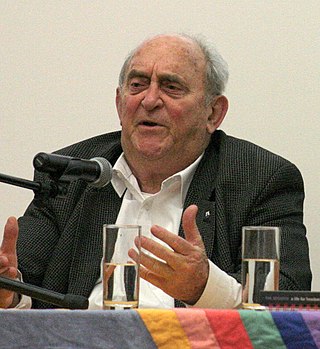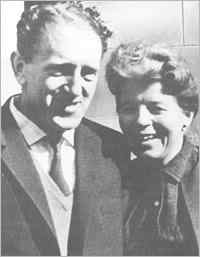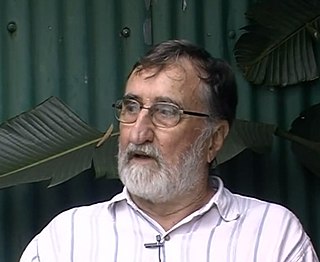
The South African Communist Party (SACP) is a communist party in South Africa. It was founded in 1921 as the Communist Party of South Africa (CPSA), tactically dissolved itself in 1950 in the face of being declared illegal by the governing National Party under the Suppression of Communism Act, 1950. The Communist Party was reconstituted underground and re-launched as the SACP in 1953, participating in the struggle to end the apartheid system. It is a member of the ruling Tripartite Alliance alongside the African National Congress and the Congress of South African Trade Unions (COSATU) and through this it influences the South African government. The party's Central Committee is the party's highest decision-making structure.

uMkhonto we Sizwe was the paramilitary wing of the African National Congress (ANC), and was founded by Nelson Mandela in the wake of the Sharpeville massacre. Its mission was to fight against the South African government.
The Rivonia Trial took place in South Africa between 9 October 1963 and 12 June 1964, and led to the imprisonment of Nelson Mandela and the others among the accused who were convicted of sabotage and sentenced to life at the Palace of Justice, Pretoria.
Raymond Mphakamisi Mhlaba was an anti-apartheid activist, Communist and leader of the African National Congress (ANC) also as well the first premier of the Eastern Cape. Mhlaba spent 25 years of his life in prison. Well known for being sentenced, along with Nelson Mandela, Govan Mbeki, Walter Sisulu and others in the Rivonia Trial, he was an active member of the ANC and the South African Communist Party (SACP) all his adult life. His kindly manner brought him the nickname "Oom Ray".

The Democratic Party (DP) was the name of the South African political party now called the Democratic Alliance. Although the Democratic Party name dates from 1989, the party existed under other labels throughout the apartheid years, when it was the Parliamentary opposition to the ruling National Party's policies.

The Defiance Campaign against Unjust Laws was presented by the African National Congress (ANC) at a conference held in Bloemfontein, South Africa in December 1951. The Campaign had roots in events leading up the conference. The demonstrations, taking place in 1952, were the first "large-scale, multi-racial political mobilization against apartheid laws under a common leadership."
Abraham Louis Fischer was a South African Communist lawyer of Afrikaner descent, notable for anti-apartheid activism and for the legal defence of anti-apartheid figures, including Nelson Mandela, at the Rivonia Trial. Following the trial he was himself put on trial accused of furthering communism. He was sentenced to life imprisonment, and diagnosed with cancer while in prison. The South African Prisons Act was extended to include his brother's house in Bloemfontein where he died two months later.
Joe Slovo was a South African politician, and an opponent of the apartheid system. A Marxist-Leninist, he was a long-time leader and theorist in the South African Communist Party (SACP), a leading member of the African National Congress (ANC), and a commander of the ANC's military wing Umkhonto we Sizwe (MK).

Ahmed Mohamed Kathrada, sometimes known by the nickname "Kathy", was a South African politician and anti-apartheid activist.
The Treason Trial was a trial in Johannesburg in which 156 people, including Nelson Mandela, were arrested in a raid and accused of treason in South Africa in 1956.
Elias Mathope Motsoaledi was a South African anti-apartheid activist and one of the eight men sentenced to life imprisonment at the Rivonia Trial in July 1963 and paternal uncle to South African politician and minister Aaron Motsoaledi. The Elias Motsoaledi Local Municipality in Limpopo province was named after him.
The Congress of the People was a gathering organised by the National Action Council, a multi-racial organisation which later became known as the Congress Alliance, and held in Kliptown on 26 June 1955 to lay out the vision of the South African people. The Freedom Charter was drawn up at the gathering, which was statement of core principles of the Alliance and a symbol of internal resistance against apartheid.

A referendum on ending apartheid was held in South Africa on 17 March 1992. The referendum was limited to white South African voters, who were asked whether or not they supported the negotiated reforms begun by State President F. W. de Klerk two years earlier, in which he proposed to end the apartheid system that had been implemented since 1948. The result of the election was a large victory for the "yes" side, which ultimately resulted in apartheid being lifted. Universal suffrage was introduced two years later.

Denis Theodore Goldberg was a South African social campaigner, who was active in the struggle against apartheid. He was accused No. 3 in the Rivonia Trial, alongside the better-known Nelson Mandela and Walter Sisulu, where he was also the youngest of the defendants. He was imprisoned for 22 years, along with other key members of the anti-apartheid movement in South Africa. After his release in 1985 he continued to campaign against apartheid from his base in London with his family, until the apartheid system was fully abolished with the 1994 election. He returned to South Africa in 2002 and founded the non-profit Denis Goldberg Legacy Foundation Trust in 2015. He was diagnosed with lung cancer in July 2019, and died in Cape Town on 29 April 2020.

Lionel "Rusty" Bernstein was a Jewish South African anti-apartheid activist and political prisoner. He played a key role in political organizations such as the South African Communist Party (SACP) and the African National Congress (ANC). He helped form the Congress of Democrats to bolster white participation in the ANC, and he brought its allies together to establish a Congress of the People, working closely with Nelson Mandela.

Hilda Bernstein was a British-born author, artist, and an activist against apartheid and for women's rights.
The Little Rivonia Trial was a South African apartheid-era court case in which several members of the armed resistance organization Umkhonto we Sizwe faced charges of sabotage. The accused were: Laloo Chiba, Dave Kitson, Mac Maharaj, John Matthews and Wilton Mkwayi. A confederate of theirs, Lionel Gay turned state witness, and in return, the prosecution dropped the charges against him.

Internal resistance to apartheid in South Africa originated from several independent sectors of South African society and took forms ranging from social movements and passive resistance to guerrilla warfare. Mass action against the ruling National Party (NP) government, coupled with South Africa's growing international isolation and economic sanctions, were instrumental in leading to negotiations to end apartheid, which began formally in 1990 and ended with South Africa's first multiracial elections under a universal franchise in 1994.
The Congress Alliance was an anti-apartheid political coalition formed in South Africa in the 1950s. Led by the African National Congress, the CA was multi-racial in makeup and committed to the principle of majority rule.

Robert Harold Lundie "Jock" Strachan was a white South African writer and anti-apartheid activist. He flew for the South African Air Force during the Second World War, trained as an artist, then became Umkhonto we Sizwe's first explosives expert. He was imprisoned for sabotage, and after his release served another sentence for telling a journalist about poor prison conditions. He wrote two semi-autobiographical books, and completed the Comrades Marathon twice, winning a medal once. He married twice and had three children.










